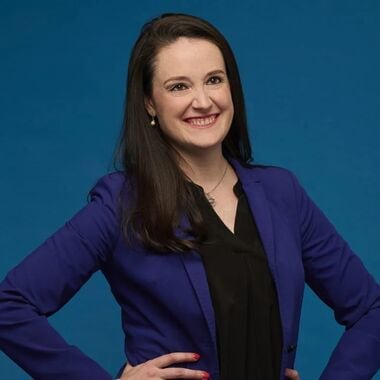Katie Wanserski Eska
Dallas-Fort Worth '09
Katie shares how her Teach For America experience shaped her career as a leader in education in Dallas-Fort Worth.
Q&A
What inspired you to join Teach For America?
I grew up in Marietta, Georgia, and graduated from the University of Notre Dame. While I originally thought I would return to my hometown of Atlanta, I was inspired to be a part of our Dallas charter corps.
As the corps came together, the entrepreneurial spirit definitely bonded us, as this group was setting the tone for what Teach For America meant in Dallas. As a group, we took intense ownership over this responsibility and wanted to ensure that Teach For America in our city was synonymous with people who worked to do right by our students.
I have since put down permanent roots here, bought a house, and have every intention of staying for the long term.
What made you decide to become a school leader?
I learned from my TFA experiences the enormous impact leadership has on teachers, students, and the larger school community. Even small leadership decisions can lead to unbelievable consequences for kids.
I wanted to become a leader that supported teachers in doing their best work thus empowering students. While I know that my job would be impossible without the support of our central district team, I believe that change happens for students at the campus level. I want to give back, support, and empower the community that helped develop me to be the person I am today.
How did your TFA experience influence your values and how you lead?
Being a part of the charter corps meant that we felt a deep responsibility to our community—and most importantly, our students—to ensure that TFA–DFW would always prioritize doing whatever it takes for success in the classroom.
I remember the entire first year feeling like a grassroots effort to earn the respect of our respective students, administrators, and communities. We worked to keep our heads down until we had data to speak for itself, which kept us focused on one outcome: student achievement. The charter corps experience taught me the importance of the “do whatever it takes” mindset and how building relationships with students and the community leads to far more success than if you attempt to do it alone.
Who were the role models who compelled you to pursue a career in education?
Teaching at Spruce High School allowed me the opportunity to work with some of the district’s strongest veteran teachers. As they discussed the students they had taught in the past and their hopes for every student who walked through their classroom door, I became increasingly focused on how individual inspirational teachers make a difference for students.
What does it mean to be part of the TFA alumni network?
The TFA alumni network has become a support system, a problem-solving team, and a rallying force when the work is tough.



